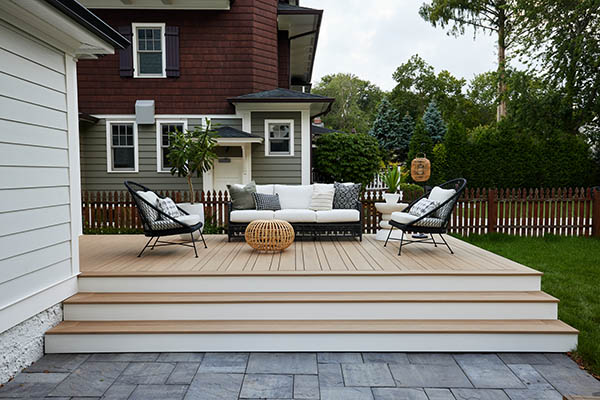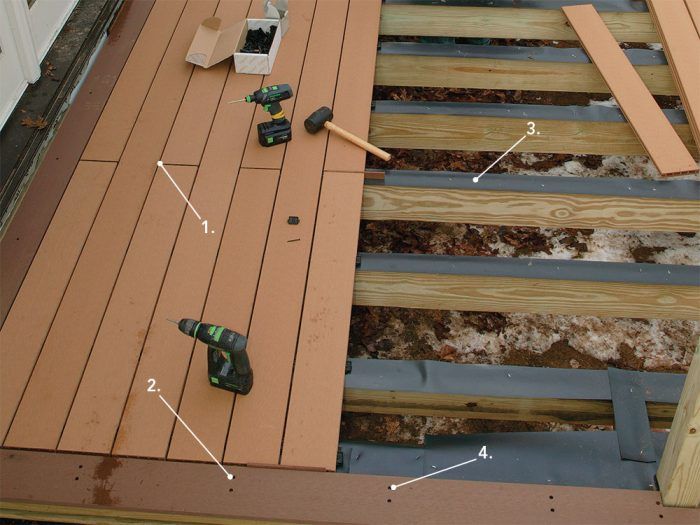Exactly how to Select the Right Materials for Your Deck Setup Task
Selecting the appropriate products for your deck installment task can appear challenging. The key is to balance your spending plan, style preferences, and lifestyle requires to create a deck that will certainly enhance your outdoor space for years to come.
Recognizing the Various Kinds Of Deck Products
When getting started on a deck setup project, the selection of products comes to be a crucial decision. Composite products, on the other hand, are a blend of timber and plastic, offering resilience and resistance to weather aspects. By comprehending these distinctions, home owners can make an extra informed choice on the most suitable deck material for their certain demands.
Reviewing the Resilience and Upkeep Needs of Deck Products
Assessing the resilience and maintenance requirements of deck products is a crucial action in deck setup. Sturdiness involves the product's ability to hold up against harsh weather, wear and tear, and its longevity. Cedar and redwood are naturally immune to rot and insects, making them long lasting options. On the other hand, pressure-treated timber, while durable, may require more upkeep because of its sensitivity to breaking and buckling.
Recognizing upkeep requirements is similarly crucial. Some products call for routine securing or tarnishing to keep their appearance and resist moisture damage, while others, like composite outdoor decking, require much less upkeep. By reviewing these elements, one can select one of the most appropriate decking product, making sure an equilibrium in between toughness, maintenance needs, and aesthetic charm.
Cost Evaluation: Contrasting Timber and Compound Decking
Although price might originally seem like a second issue, it is a substantial variable when comparing timber and composite outdoor decking. Wood, generally a less expensive choice, has a lower upfront price. Nonetheless, over time, upkeep expenditures can accumulate, possibly making wood more pricey over time. These maintenance prices might include staining, securing, or changing harmed boards. On the other hand, composite outdoor decking, while pricier originally, needs less upkeep, possibly decreasing lasting costs. Yet, it's important to keep in mind that composite decking isn't invulnerable to damage, and substitute expenses can be high. Consequently, prospective deck owners need to consider their budget plan and desire to preserve their decks when choosing between timber and composite decking.
Appearances and Layout Versatility of Decking Products
While price is an essential factor to consider, the aesthetic allure and style versatility of outdoor decking materials additionally play a significant function in the decision-making procedure. Various products provide differing degrees of aesthetic charm. All-natural wood outdoor decking provides a timeless, timeless look, while composite products supply a large variety of shades and appearances to suit varied preferences and designs. Similarly, layout versatility refers to the capacity to shape and control the outdoor decking product to meet specific layout requirements. Timber, as an example, uses high design versatility as a result of its convenience of cutting and shaping. Compound products, while less adaptable in style, are still versatile sufficient for a lot of deck styles. These factors, as a result, are vital determinants in the selection of outdoor decking material.
Ecological Effect of Decking Materials
When choosing decking products, one must consider not only appearances and durability, yet likewise the environmental effect. It is necessary to assess the sustainability of products and explore recycled decking options. Furthermore, comprehending the prospective effect on neighborhood ecological communities will ensure a more eco accountable choice.
Assessing Product Sustainability
In the realm of deck building and construction, examining product sustainability is a crucial step. This involves reviewing the ecological impact of each potential product, taking into consideration factors such as the power required for its production, its carbon impact, and its end-of-life disposal or recycling alternatives. For instance, timber is a renewable energy, however unsustainable logging practices can lead to deforestation. Alternatively, composite decking products usually incorporate timber and plastic, lowering the demand for brand-new wood yet enhancing dependence on fossil fuels. Aluminum and various other steels may be more durable and recyclable, yet their extraction and handling can be energy-intensive. Therefore, the selection of decking materials need to balance performance, appearances, cost, and sustainability to ensure a responsible and resilient installment.
Recycled Outdoor Decking Choices

Compound outdoor try this out decking is especially preferred because of its resilience and simplicity of upkeep. It's immune to rot, pests, and fading, making it a durable option. Recycled plastic decking, on the various other hand, is very resistant and calls for minimal upkeep. While these materials may bring a greater preliminary price, their longevity and decreased ecological effect make them a sensible financial investment for the eco-conscious home owner.

Influence on Local Environments
While the advantages of making use of recycled products for decking can not be overemphasized, it's just as essential to take into consideration the wider ecological effects of these options. The removal, processing, and transport of products can profoundly affect neighborhood environments. Deforestation for timber outdoor decking adds to habitat loss and climate adjustment. Also the production of composite materials can launch harmful discharges. On the other hand, making use of recycled or sustainably sourced materials can assist mitigate these impacts. In addition, considering the life expectancy of products can minimize ecological effect; longer-lasting options call for less regular substitute, therefore saving sources. Ultimately, appropriate disposal of old decking is crucial to decreasing land fill waste (deck installation austin tx). Essentially, an eco-conscious deck project needs mindful material option, sustainable sourcing, and responsible disposal.
Making Your Last Decision: Tips for Picking the very best Deck Materials
As the short article transitions right into the subtopic of "Making Your Final Decision: Tips for Picking the very best Deck Products", it is critical to comprehend the variety of deck products offered. Striking a balance in between durability and appearance is vital in this selection process. The complying with discussion will certainly lead viewers in making an informed option based upon these key considerations.
Comprehending Various Deck Products
The task of selecting the appropriate materials for your deck setup can seem daunting as a result of the huge variety of options readily available. Recognizing the various products can simplify this procedure. Wood is a popular option, providing a traditional aesthetic and price. Types of why not try these out timber made use of include pressure-treated lumber, cedar, and redwood. Compound materials, made from a blend of wood and plastic, are low-maintenance and resistant to rot and insects. Vinyl or PVC decks are much more resilient and need less maintenance than composite materials, but they can look much less natural. Light weight aluminum decks are strong, light-weight, and resistant to rot, yet they are also the most pricey option. Each product has its own advantages and downsides, making it critical to consider your details needs prior to making a decision.
Resilience vs. Aesthetic Appeals Balance
Stabilizing longevity with aesthetic appeals can be a challenge when picking deck products. The choice often comes down to personal preferences and the deck's planned use. High-traffic locations may require durable materials like composite decking, which holds up against wear and tear but may do not have the all-natural beauty of timber. On the various other hand, wood uses a timeless appeal and heat that artificial products battle to duplicate. Nevertheless, it requires extra maintenance and may not last as long. House owners require look at this now to strike an equilibrium, considering both the deck's functional needs and their aesthetic preferences. By doing so, they can guarantee their deck stays a functional and attractive exterior space for years to come.
Final thought
To conclude, picking the ideal products for your deck installment project needs careful consideration of aspects such as longevity, maintenance, cost, visual appeals, and ecological impact. Whether you choose traditional timber or composite products, your option must straighten with your budget plan, style preferences, and way of life. Eventually, the ideal decking material is one that improves your exterior space and offers pleasure for several years to come.